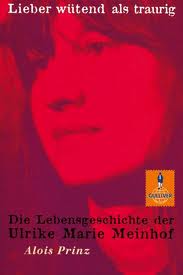
- Better Mad Than Sad
- Published by: Beltz GmbH
- Level: Intermediate
- First Published in: 2003
Biography of Ulrike Meinhof, a German journalist who wrote for the left-wing magazine Konkret and co-founded the Red Army Faction.During her early years, she became involved in protests at the University of Münster against the Bundeswehr (the German army). She also acted as a spokeswoman for the local Anti-Atomtod-Ausschuss (Anti-Atomic Death Committee) and joined the APO, the Außerparlamentarische Opposition (Extra-parliamentary opposition).

Lieber wütend als traurig (Better Mad than Sad) by Alois Prinz is a biography of Ulrike Meinhof , a German journalist who wrote for the left-wing magazine Konkret and co-founded the Red Army Faction. During her early years, she became involved in protests at the University of Münster against the Bundeswehr (the German army) due to its involvement with nuclear weapons. She also acted as a spokeswoman for the local Anti-Atomtod-Ausschuss (Anti-Atomic Death Committee). After divorcing her husband, she moved to Berlin with her twin daughters and joined the APO, the Außerparlamentarische Opposition (Extra-parliamentary opposition).
"Although she was passionate about her beliefs, she was not considered a real 'Kader', or guerrilla cadre."
In 1967, the West German student movement expanded and radicalized after the brutal police shooting of student Benno Ohnesorg, who was in a demonstration against the visit of the Shah Mohammad Reza Pahlavi. Then, on April 11, 1968, the sociologist and activist Rudi Dutschke was shot three times and barely survived, which further inflamed the situation. The student movement blamed Springer Press (the publisher responsible for the conservative German newspaper Die Welt , among other publications) and Ulrike joined the protest, handing out stones. She described the ensuing shattering of glass as “Brefreiungsklang,” the sound of liberation. The next day, she wrote, “Wirft man einen Stein, so ist das eine strafbare Handlung. Werden tausende Steine geworfen, ist das eine politische Handlung” (Throw one stone and it’s a criminal offence. If thousands of stones are thrown, it’s a political act).

At about that time, Ulrike no longer believed her journalistic work to be adequate in her fight against society. When she was hired to report on two suspected arsonists, Andreas Baader and Gudrun Ensslin, she found herself agreeing with their reasoning. She referred to the police officers as “Bullen” (bulls), an expression that derives from the Dutch term “Bol,” meaning “clever person.” It was only during the 60s, at the height of student demonstrations and after the founding of the APO, that “Bulle” turned into a swear word. To Meinhof, Baader, and those who thought like them, any policeman was just a “Typ in Uniform” (type in uniform). To describe someone as “Der Typ” (that type) is not exactly polite, as it suggests that the person in question is from a different social class or group. Eventually, Ulrike helped Baader escape imprisonment, which earned her a place in the Fahndungsliste (Most Wanted List).
Although she was passionate about her beliefs, she was not considered a real “Kader,” or guerrilla cadre. The term originated in Switzerland and it describes a group of military commanders or individual superior civilians. Meinhof would often fail her missions, like the Red Army Faction’s first bank robbery, in which she forgot a bag filled with a substantial amount of money and returned with only 8000 DM. The rest of the group jokingly said, “Die paar Mark hättest du dir bei konkret auch verdienen können” (You could have earned those few bucks at Konkret too). Despite the recent adoption of the euro currency, the expression “paar Mark” is still widely used in Germany, as in “ Das kostet nur ein paar Mark ” (That only costs a few marks).
Ulrike Meinhof, Baader, and Ensslin were arrested on May 1975. After several hunger strikes, bouts of psychological terror, and attempts by the Red Army Faction to liberate them (which included the kidnapping and murder of Hanns Martin Schleyer), Meinhof was found strangled inside her cell a year later. There are still doubts as to whether or not it was actually a suicide.

